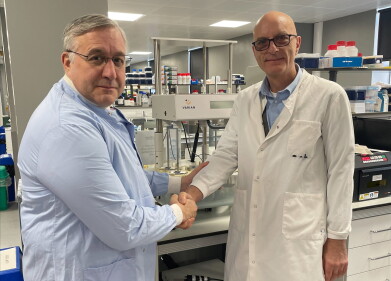News
Enzymes Found to Reduce Plant Fibre
Aug 17 2018
Scientists at Portsmouth University have been working closely with researchers at Diamond Light Source to investigate a new family of enzymes which have shown the capability to break down lignin, the tough, supportive fibre found in plant cell walls. The discovery has opened potential areas of development for the conversion of plant waste into sustainable products such as plastics, chemicals and fuels.
The Macromolecular Crystallography beamlines I03 and I04 at Diamond were used to explore the atomic structure of the new enzyme.
“To protect their sugar-containing cellulose, plants have evolved a fascinatingly complicated material called lignin that only a small selection of fungi and bacteria can tackle. However, lignin represents a vast potential source of sustainable chemicals, so if we can find a way to extract and use those building blocks, we can create great things,” said Professor John McGeehan, Director of the Institute of Biological and Biomedical Sciences in the School of Biological Sciences at Portsmouth.
From their investigations the research team has been able to overcome obstacles in the process of breaking down lignin to its basic chemicals providing a route to making new materials and chemicals including bioplastics and carbon fibre, from what is currently a waste product.
The discovery also offers additional environmental benefits – creating products from lignin reduces our reliance on oil to make everyday products and offers an attractive alternative to burning it, helping to reduce CO2 emissions.
The discovery was led by members of the same UK-US team which improved on a naturally occurring enzyme originally discovered at a recycling centre, capable of breaking down plastics*.
“This is another great example of how international collaboration can help make significant scientific progress. We are providing world-leading analytical tools to our user community and are clearly fulfilling our role as an agent of change on 21st century global challenges. It is fantastic that UK scientists and facilities are helping to lead the way,” said Prof Dave Stuart, Life Science Director at Diamond Light Source and MRC Professor of Structural Biology at the Department of Medicine University of Oxford.
*International Labmate May/June Guide, Microscopy News
Digital Edition
ILM 50.2 March 2025
March 2025
Chromatography Articles - Effects of small deviations in flow rate on GPC/SEC results Mass Spectrometry & Spectroscopy Articles - Waiting for the present to catch up to the future: A bette...
View all digital editions
Events
Mar 31 2025 Beijing, China
Microbiology Society Annual Conference 2025
Mar 31 2025 Liverpool, UK
Apr 01 2025 New York, USA
Apr 02 2025 Saigon, Vietnam
Apr 09 2025 Tokyo, Japan




















